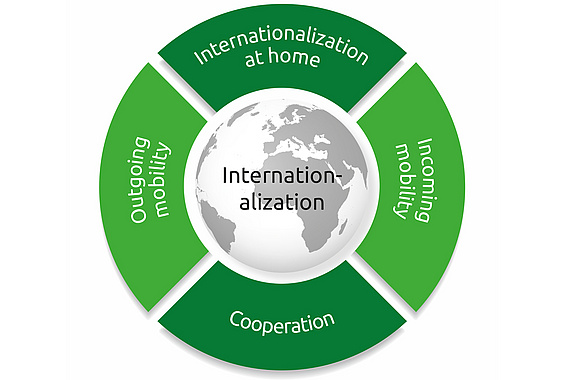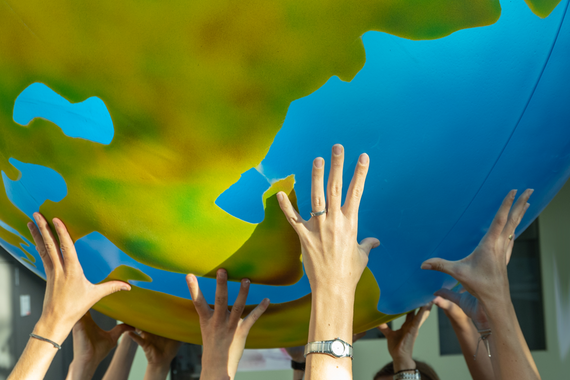- The University
- Studying
-
Research
- Profile
- Infrastructure
- Cooperations
- Services
-
Career
- Med Uni Graz as an Employer
- Educational Opportunities
- Work Environment
- Job openings
-
Diagnostics
- Patients
- Referring physicians
-
Health Topics
- Health Infrastructure
Internationality
The Medical University of Graz is one of the best "young" universities worldwide. As a university with an international reputation, it must continue to develop its position as an attractive research location and prepare students and staff for international careers as best as it can. Thus internationalization is part of its mission and implemented in four fields of action.

International Office
- Establish, maintain and expand international cooperation through bilateral and network agreements to create opportunities for studies, teaching and research along the lines of the Internationalization Strategy
- Evaluate and facilitate internal and external international cooperation requests
- Promote and administer student and staff mobility abroad and to Graz
- Provide services to international staff and degree-seeking students through the Welcome Center
- Administrate national and international guest stays
- Advocate Internationalization@Home
- Develop and coordinate non-traditional mobility schemes e.g. international short courses
- Increase the number of joint programs
- Expand the number of courses taught in English
- Manage visiting professorships
Fields of action & topics

Incoming mobility
Mobility is an integral component of the internationalization process at Med Uni Graz. As a university with an international reputation, it offers students, staff, doctors, researchers and other guests from abroad several opportunities for a stay at Med Uni Graz:
- Study abroad
- Clinical rotations/traineeships
- Clinical fellowship
- International short courses
- Staff mobility for teaching or training
- Research stays
- Guest stays that are non-medical and related to education

Outgoing Mobility
Med Uni Graz students can receive support to go abroad several times during their studies for study abroad, clinical rotations, parts of the clinical practice year, traineeships in dentistry or nursing and also selected research stays and summer/winter schools. All Med Uni Graz staff also have the opportunity to complete a funded staff mobility for teaching or for training abroad.

Internationalization at home
Med Uni Graz offers its international students and staff an attractive work environment and home. It operates a welcome center that provides advising and support to new arrivals, establishes first contacts and promotes social integration. Services and processes for foreign guests are also available in English and thus easily accessible. Taught exclusively in English, the Ph.D. program is the heart of an open, innovative and international research and teaching community. Topics in this field of action are:
- Welcome Center
- Guest professorships
- Teaching in English

Cooperation
Med Uni Graz is active and connected in numerous international university networks and framework programs around the world, and has bilateral partnerships in research and teaching with excellent universities on nearly all continents. It does not focus on specific geographical regions since there are outstanding institutions in different disciplines worldwide and the quality of research and teaching is pivotal to strategic cooperation.
- Bilateral partnerships in research and teaching
- Network cooperation

Focus Internationalization
Internationalization is a central element of the development plan of the Medical University of Graz and is seen as an integral part of the university's tasks. As part of its core values, Med Uni Graz has committed itself to further developing its position as an attractive research location and to preparing its students and staff for successful careers in an international context. Promoting outstanding achievements in competence development is a matter of great concern in this process.
Internationalization Strategy of the Medical University of Graz
Preamble
Internationalization is a central element of the development plan of the Medical University of Graz and is seen as an integral part of the university's mission:
“Internationalisation of higher education is the process of integrating an international/intercultural dimension into the teaching, research and service functions of the institution.”
KNIGHT, J. (1994), Internationalisation: Elements and Checkpoints, Canadian Bureau for International Education, Ottawa
Internationalization at Med Uni Graz is viewed as a cross-sectional topic spanning all areas - research, teaching and administration. The topic is therefore central to the entire development plan and especially highlighted in the sections International mobility, Cooperation and Networking. Med Uni Graz aims to further develop the existing internationalization initiatives and to increase the global visibility and competitiveness.
The university sees its international orientation and active participation in global scientific discourse as a basic requirement for achieving sustainable success in research and teaching. The comprehensive approach spans beyond the promotion of mobility measures. Sustainable internationalization - and thus actively lived internationality - requires that dimensions of internationality are anchored as self-evident aspects in the thoughts and actions of the university members at all levels.
The Medical University of Graz – founded as a faculty in 1863 and established as an independent university in 2004 - was listed in the 2019 Nature Index as one of the top 30 academic institutions under 30, i.e., it is one of the best "young" universities worldwide. As part of its core values, Med Uni Graz has committed itself to further developing its position as an attractive research location and to preparing its students and staff for successful careers in an international context. Promoting outstanding achievements in competence development is a matter of great concern in this process. As a vital part of its mission, the university implements internationalization activities within the framework of the following fields of action:
Cooperation
Med Uni Graz cooperates with numerous research/higher education institutions and private companies worldwide and continues to be open for new partnerships that add value to its research and teaching endeavors. Researchers are active players in the European Research Area and participate in the European Framework Programs HORIZON. The university also takes a cooperative approach regarding its research infrastructure. Its Center for Knowledge and Technology Transfer in Medicine is the first technology and research center in Austria to achieve full physical and organizational integration into a university campus. It thus provides a perfect location for cooperation between science and industry. The Medical University of Graz also houses the headquarters of the biobanking infrastructure BBMRI-ERIC, established by the European Commission as a European and international biobanking hub.
Incoming & Outgoing Mobility
Med Uni Graz holds bilateral partnerships in research and teaching with excellent institutions on nearly all continents. It does not focus on specific geographical regions as it considers the quality of research and teaching in a specific subject as the primary criterion for strategic cooperation. Med Uni Graz fosters incoming and outgoing mobility of students, faculty and staff by providing services and financial support tailor-made for the relevant target groups. As a local contact point of the European EURAXESS Network for researchers’ mobility, the university also provides access to the wide spectrum of EURAXESS services. Med Uni Graz is a member of CEEPUS, the ASEA Uninet, the Eurasia-Pacific Uninet and the Africa-UniNet, networks that facilitate project and mobility cooperation in a multitude of counties around the globe. In terms of student, faculty and staff mobility, the university furthermore takes part in various schemes of Erasmus+ as well as the Africa-UniNet.
Internationalization at Home
Med Uni Graz offers both an attractive working environment and a home to international students, faculty and staff. It runs a Welcome Center, which offers a variety of services ranging from advice to hands-on support as well as social networking opportunities for newly-arrived members of the university community. Services and processes relevant for guests from abroad are available in English and thus easily accessible. The PhD programs – which are fully taught in English – contribute to further internationalize an open and innovative research and teaching community.

Bilateral partner institutions
Med Uni Graz has bilateral partnerships in research and teaching with excellent universities on nearly all continents. It does not focus on specific geographical regions since there are outstanding institutions in different disciplines worldwide and the quality of research and teaching is pivotal to strategic cooperation.
Bilateral/Network/Framework partners by country
A–D
Albania
- Canadian Institute of Technology (Erasmus+ International Credit Mobility)
- University of Medicine Tirana (Erasmus+ International Credit Mobility)
Australia
- University of Newcastle (bilateral cooperation)
- University of Queensland (bilateral cooperation, Erasmus+ International Credit Mobility)
- University of Western Australia (bilateral cooperation)
- University of Wollongong (bilateral cooperation)
Belgium
- Belgium: KU Leuven (Erasmus+ KA131)
Brazil
- Universidade Federal do Rio de Janeiro (bilateral cooperation)
- Universidade Estadual Paulista (Erasmus+ International Credit Mobility)
Canada
- Dalhousie University (bilateral cooperation, Erasmus+ International Credit Mobility)
- University of Alberta (bilateral cooperation)
- McGill University (bilateral cooperation)
- Western University (bilateral cooperation)
Chile
- Pontificia Universidad Católica de Chile (bilateral cooperation, Erasmus+ International Credit Mobility)
- Universidad de Valparaíso (bilateral cooperation, Erasmus+ International Credit Mobility)
China
- Fujian Institute of Research on the Structure of Matter, Chinese Academy of Sciences (bilateral cooperation)
- Beijing University of Chinese Medicine (Eurasia-Pacific-UNINET)
- Fudan University Shanghai (Eurasia-Pacific-UNINET)
- University of Hongkong (Eurasia-Pacific-UNINET)
- Tongji University (Eurasia-Pacific-UNINET)
- Wenzhou Medical University (bilateral cooperation)
Colombia
- Universidad CES (bilateral cooperation, Erasmus+ International Credit Mobility)
Croatia
- Univiersity of Rijeka (Erasmus+ KA131)
Cuba
- Universidad de Ciencias Médicas de La Habana (bilateral cooperation)
Czech Republic
- Univerzita Karlova (1. lékařská fakulta) (Erasmus+ KA131)
- Univerzita Karlova (2. lékařská fakulta) (Erasmus+ KA131)
- Univerzita Karlova (3. lékařská fakulta) (Erasmus+ KA131)
- Univerzita Karlova (Lékařská fakulta UK v Hradci Králové) (Erasmus+ KA131)
Denmark
- Aarhus Universitet (Erasmus+ KA131)
- Københavns Universitet (Erasmus+ KA131)
Dominican Republic
- Instituto Tecnológico de Santo Domingo (bilateral cooperation)
E–M
France
- Aix-Marseille Université (Erasmus+ KA131)
- Université Catholique de Lille (Erasmus+ KA131)
- Université Claude Bernard, Lyon I (Erasmus+ KA131)
- Université de Bordeaux (bilateral cooperation)
- Université de Bretagne Occidentale (Erasmus+ KA131)
- Université de Caen (Erasmus+ KA131)
- Université de Strasbourg (Erasmus+ KA131)
- Université Montpellier 1 (Erasmus+ KA131)
- Université Paris 13 (Erasmus+ KA131)
- Université Paris Descartes (Erasmus+ KA131)
- Université Paul Sabatier - Toulouse III (Medical studies) (Erasmus+ KA131)
Germany
- Charité Centrum 1 für Human- und Gesundheitswissenschaften (bilateral cooperation)
- Eberhard Karls Universität Tübingen (Medizinische Fakultät) (Erasmus+ KA131)
- Ernst-Moritz-Arndt-Universität Greifswald (Erasmus+ KA131)
- Friedrich-Alexander Universität Erlangen-Nürnberg (Erasmus+ KA131)
- Goethe Universität Frankfurt am Main (Erasmus+ KA131)
- Johannes Gutenberg-Universität Mainz (Universitätsmedizin Mainz) (Erasmus+ KA131)
- Medizinische Hochschule Hannover (Erasmus+ KA131)
- Medizinische Universität zu Lübeck (Erasmus+ KA131)
- Rheinische Friedrich-Wilhelms-Universität Bonn (Erasmus+ KA131)
Greece
- Panepistimio Kritis (Erasmus+ KA131)
- University of Patras (Erasmus+ KA131)
Hungary
- Semmelweis Egyetem (Erasmus+ KA131)
India
- All India Institute of Ayurveda (bilateral cooperation)
- Manipal Academy of Higher Education (bilateral cooperation)
Indonesia
- Gadjah Mada University (ASEA-UNINET)
Ireland
- University College Dublin (bilateral cooperation)
Israel
- Tel Aviv University (bilateral cooperation, Erasmus+ International Credit Mobility)
Italy
- Università degli Studi di Cagliari (Erasmus+ KA131)
- Università degli Studi di Firenze (Erasmus+ KA131)
- Università degli Studi di Genova (Erasmus+ KA131)
- Università degli Studi di Insubria (Erasmus+ KA131)
- Università degli Studi di Napoli Federico II (Erasmus+ KA131)
- Università degli Studi di Parma (Erasmus+ KA131)
- Università degli Studi di Trieste (Erasmus+ KA131)
- Università Politecnica delle Marche (Erasmus+ KA131)
- University of Udine (bilateral cooperation)
Japan
- Hiroshima University (bilateral cooperation)
- Kobe University (bilateral cooperation)
Latvia
- Rigas Stradina universitate (Erasmus+ KA131)
Lithuania
- Lietuvos sveikatos mokslų universiteta (Erasmus+ KA131)
- Vilniaus Universitetas (Erasmus+ KA131)
Mexico
- Universidad de Guadalajara (bilateral cooperation)
- Universidad de Monterrey (bilateral cooperation, Erasmus+ International Credit Mobility)
Morocco
- Université Internationale Abulcasis des Sciences de la Santé (bilateral cooperation)
N–S
Nepal
- Kathmandu University (bilateral cooperation, Erasmus+ International Credit Mobility)
New Zealand
- University of Otago (bilateral cooperation)
Norway
- Kristiania University College (Erasmus+ KA131)
- Norwegian University of Science and Technology (NTNU) - Faculty of Medicine (Erasmus+ KA131)
Oman
- Sultan Qaboos University (bilateral cooperation)
Peru
- Universidad San Ignacio de Loyola (Erasmus+ International Credit Mobility)
Poland
- Uniwersytet Jagiellonski, Collegium Medicum (Erasmus+ KA131)
- Uniwersytet Medyczny w Lodzi (Erasmus+ KA131)
Portugal
- Universidade de Lisboa (Erasmus+ KA131)
- Universidade do Porto (Erasmus+ KA131)
Romania
- University of Medicine and Pharmacy "Iuliu Hatieganu" Cluj-Napoca (Erasmus+ KA131)
Russia
- Bakoulev Center for Cardiovascular Surgery/Russian Academy of Medical Sciences (bilateral cooperation)
Switzerland
- Universität Basel (Swiss-European Mobility Programme)
- Universität Bern (Swiss-European Mobility Programme)
- Universität Zürich (Swiss-European Mobility Programme)
Slovenia
- Alma Mater Europaea – European Centre Maribor (bilateral cooperation)
- Univerza v Ljubljani (Erasmus+ KA131)
- Univerza v Mariboru (Erasmus+ KA131)
South Africa
- University of Cape Town (Erasmus+ International Credit Mobility)
- University of KwaZulu-Natal (bilateral cooperation, Erasmus+ International Credit Mobility)
- Stellenbosch University (bilateral cooperation, Erasmus+ International Credit Mobility)
- Walter Sisulu University (bilateral cooperation, Erasmus+ International Credit Mobility)
South Korea
- EWHA Womans University (bilateral cooperation)
Spain
- Universidad CEU San Pablo (Erasmus+ KA131)
- Universidad de La Laguna (Erasmus+ KA131)
- Universidad de Salamanca, Facultad de Medicina (Erasmus+ KA131)
- Universidad de Valencia (Erasmus+ KA131)
- Universidad del País Vasco / Euskal Herriko Unibertsitatea (Erasmus+ KA131)
- Universidad Miguel Hernandez de Elche (Erasmus+ KA131)
- Universitat de Barcelona, Faculty of Medicine and health sciences (Erasmus+ KA131)
- Universitat internacional de Catalunya, Facultat de Medicina (Erasmus+ KA131)
Sweden
- Lund University (Erasmus+ KA131)
T–Z
Taiwan
- National Taiwan University (bilateral cooperation)
Thailand
- Chiang Mai University (ASEA-UNINET, Erasmus+ International Credit Mobility)
- Chulalongkorn University (ASEA-UNINET)
- Khon Kaen University (ASEA-UNINET)
- Mahidol University, Faculty of Tropical Medicine (ASEA-UNINET)
- Mahidol University, Ramathibodi Hospital (ASEA-UNINET)
The Netherlands
- Leiden University / Medical Center (Erasmus+ KA131)
- Rijksuniversiteit Groningen (Erasmus+ KA131)
- University of Maastricht (bilateral cooperation)
Türkiye
- İstanbul Üniversitesi Cerrahpaşa (Erasmus+ KA131)
Uganda
- Kyambogo University (Erasmus+ International Credit Mobility)
- Makerere University (bilateral cooperation, Erasmus+ International Credit Mobility)
USA
- Central Michigan University (bilateral cooperation, Erasmus+ International Credit Mobility)
- George Washington University (bilateral cooperation)
- National Center for Adaptive Neurotechnologies (bilateral cooperation)
- Nova Southeastern University (bilateral cooperation)
- Rutgers Robert Wood Johnson Medical School (bilateral cooperation)
- Texas A&M University (bilateral cooperation)
- University of Kentucky (bilateral cooperation)
- University of Missouri – Kansas City (bilateral cooperation, Erasmus+ International Credit Mobility)
Usbekistan
- Samarkand State Medical Institute (bilateral cooperation)
Vietnam
- University of Medicine and Pharmacy at Ho Chi Minh City (ASEA-UNINET)

Support for the Ukraine
The support initiative of Med Uni Graz primarily aims at Ukrainian citizens who had to leave Ukraine after February 24, 2022 due to the current situation. Due to the health-orientation of the university, students and staff members from the health sector should feel primarily addressed, especially students of medicine and dentistry, as well as researchers from the preclinical and clinical settings.
More information
International Office
Neue Stiftingtalstraße 6 - WEST, Tower Q, 6th floor, 8010 Graz
T: +43 316 385 73675
Director of the International Office
Please contact us
Directors & Assistance
Director
Deputy director
Director's assistant
Cooperations
Cooperations
Admin. cooperation agreements worldwide, Erasmus+ KA171
Admin. Cooperation agreements, Erasmus+ KA131 (Institutional Coordinator)
Incoming student mobility
CEEPUS
Clinical Rotations & Research Abroad
Erasmus+ KA131 traineeship (SMT)
Erasmus+ KA131 studies (SMS)
Erasmus+ KA171 studies, traineeship (SMS, SMT)
Joint Study
Short Courses (Summer Schools, Winter Schools)
Swiss-European Mobility Programme (SEMP)
Incoming Staff Mobility
CEEPUS
Erasmus+ KA131 Teaching or training stay (STA, STT)
Erasmus+ KA171 Teaching or training stay (STA, STT)
- Iris Topolovec, erasmus-icm(at)medunigraz.at
- Dagmar Wallenstorfer, erasmus-incoming-staff(at)medunigraz.at
Swiss-European Mobility Programme (SEMP)
Clinical Fellowship
Outgoing Student Mobility
CEEPUS
Clinical Rotations & Research Abroad
Erasmus+ KA131 Study visit, internship (SMS, SMT)
Freemover
Joint Study
Marshall Plan-Scholarship
Swiss-European Mobility Programme (SEMP)
Outgoing Staff Mobility
CEEPUS
Erasmus+ KA131 Teaching or training stay (STA, STT)
Erasmus+ KA171 Teaching or training stay (STA, STT)
Swiss-European Mobility Programme (SEMP)



